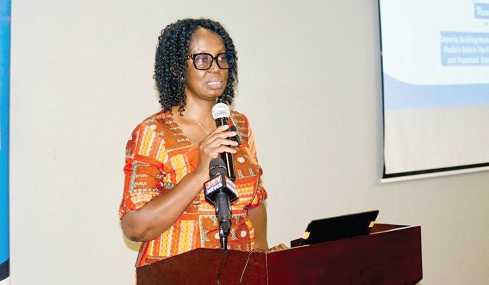
Make political parties more accountable - Anti-corruption coalition
The Executive Secretary of the Ghana Anti-Corruption Coalition (GACC), Beauty Emefa Narteh, is pushing for changes to the Political Parties Act, 2000 (Act 574), to make actors more accountable.
Advertisement
She said most often, the huge sums of money quoted by politicians to contest for political office either as Members of Parliament (MPs) or the presidency did not match with the audited accounts of political parties lodged at the Electoral Commission (EC).
Mrs Narteh said political campaign finances were handled by individuals contesting parliamentary seats at the level of constituencies, or flagbearers at the national level.
“With no accountability measures in the law, they had control over all resources received by them and because such funds were not accounted for formally by the individuals or the party, there were disparities between what political parties reported in their audited accounts at the EC, and what individuals often claimed to have spent on their respective campaigns.
“In some jurisdictions like the US, that is not so. Political party money or funds are seen as public funds and thus, accounted for,” she said.
Safeguarding stability
Mrs Narteh said that in an interview with the Daily Graphic during a capacity-building workshop for about 50 journalists, as well as some selected civil society organisations (CSOs) on “Safeguarding Ghana's stability in the face of Serious and Organised Crime (SOC) threats during the 2024 Elections”.
The capacity-building workshop was organised with some partners of GACC, including the Ghana Integrity Initiative (GII), the Economic and Organised Crime Office (EOCO), Foreign, Commonwealth and Development Office (FCDO) and the Africa Centre for Energy Policy (ACEP).
The workshop was to enhance the capacity of journalists to contribute to the fight against SOC threats in the lead-up to the 2024 elections.
Fight against corruption
Mrs Narteh said if the law could not be changed immediately, flag bearers of the various parties, and contesting members of Parliament could decide to be accountable by stating publicly how much they were receiving and how they were spending it.
“This way, I will be convinced when a flag bearer of Member of Parliament says he or she would champion the fight against corruption when elected into office because even before coming into office he or she is striving to be accountable,” she said.
The executive secretary said that posture would also safeguard the country’s elections.
Public accountability
Currently, although the Political Parties Act, 2000 (Act 574) proscribes the involvement of foreigners in the country’s politics, that could not be ascertained, and a change in the laws or public accountability by political contestants was, therefore, the way to go to avoid the situation where foreigners could dictate the outcome of elections.
Welcoming journalists to the meeting, Mrs Narteh highlighted the pivotal role of the media in shaping the narrative of democracy.
Hence, the meeting was to increase awareness and interest in the issues of elections and SOC, she said.
Other speakers at the meeting were the Head Technical Unit (IT and Cyber Crime) at the EOCO, Amankwah Attah; the Director of Strategy and Communications at the Office of the Special Prosecutor, Sammy Darko, and Kwaku Krobea Asante of the Media Foundation for West Africa, who took journalists through features of serious organised crime, the workings of the OSP in dealing with SOC, and how journalists could report factually on serious organised crimes and the elections.




